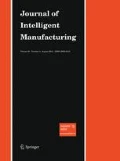Abstract
There is a small subset of any repairable component population that can develop a failure mode outside the scope of the standard repair and overhaul procedures, which makes them “rogue”. When this happens, a Darwinian-like “natural selection” phenomenon ensures that they will be placed in the most disadvantageous position in the asset management program, negatively affecting multiple aspects of the operational and maintenance organizations. Rogue components have long plagued the airline industry and created havoc in their asset management programs. In this paper, we describe how these rogues develop, outline the natural selection process that leads to their hampering the asset management program, and examine some of the negative impacts that ensue. Then we propose a Condition based maintenance approach to control the development of these components. We explore the use of a supervised learning data mining technique called Logical analysis of data (LAD) in CBM for the purpose of detecting rogues within a population of repairable components. We apply the resulting LAD based decision model on an inventory of turbo compressors belonging to an airline fleet. Finally, we evaluate the applicability of LAD to the rogue component detection problem and review its efficiency as a decision model for this type of problem.
Similar content being viewed by others
References
Boros E., Hammer P. (2000) An implementation of logical analysis of data. IEEE Transactions on Knowledge and Data Engineering 12(2): 292–306
Cama Y., Hammer P. L., Ibaraki T. (1988) Cause-effect relationships and partially defined Boolean functions. Annals of Operations Research 16(1): 299–325
Carroll, T. (2008). The statistical outliers are in control of asset management. In The maintenance and reliability conference MARCON 2008. Tennessee, USA.
Flint, P. (2007). Balancing act: Rising demand for MRO services occurs against a backdrop of steady market evolution. Air Transport World. November 2007, 46–47. http://www.atwonline.com/magazine/article.html?articleID=2115. Accessed 24 May 2009.
Kilpi J., Vepsalainen A. P. J. (2004) Pooling of spare components between airlines. Journal of Air Transport Management 10(2): 137–146
Leung T., Carroll T., Hung M., Tsang A., Chung W. (2007) The Carroll-Hung method for component reliability mapping in aircraft maintenance. Quality and Reliability Engineering International 23: 137–154
OAG. (2008). Global MRO spend on military aviation to increase by 14.9% over the next decade, reports OAG. Official Airline Guide. http://www.oag.com/oagcorporate/pressreleases/08+GLOBAL+MRO+SPEND+ON+MILITARY+AVIATION+TO+INCREASE.html. Accessed 29 April 2009.
Salamanca, D. (2008). Logical analysis of data applied in condition based maintenance. M.Sc. Thesis, Department of. Industrial Engineering, Ecole Polytechnique de Montreal.
Teal, C., & Sorensen, D. (2001). Condition based maintenance [aircraft wiring]. In The 20th conference on digital avionics systems, Daytona Beach, FL, 1, 3B2/1–3B2/7.
Author information
Authors and Affiliations
Corresponding author
Rights and permissions
About this article
Cite this article
Mortada, MA., Carroll, T., Yacout, S. et al. Rogue components: their effect and control using logical analysis of data. J Intell Manuf 23, 289–302 (2012). https://doi.org/10.1007/s10845-009-0351-1
Received:
Accepted:
Published:
Issue Date:
DOI: https://doi.org/10.1007/s10845-009-0351-1




